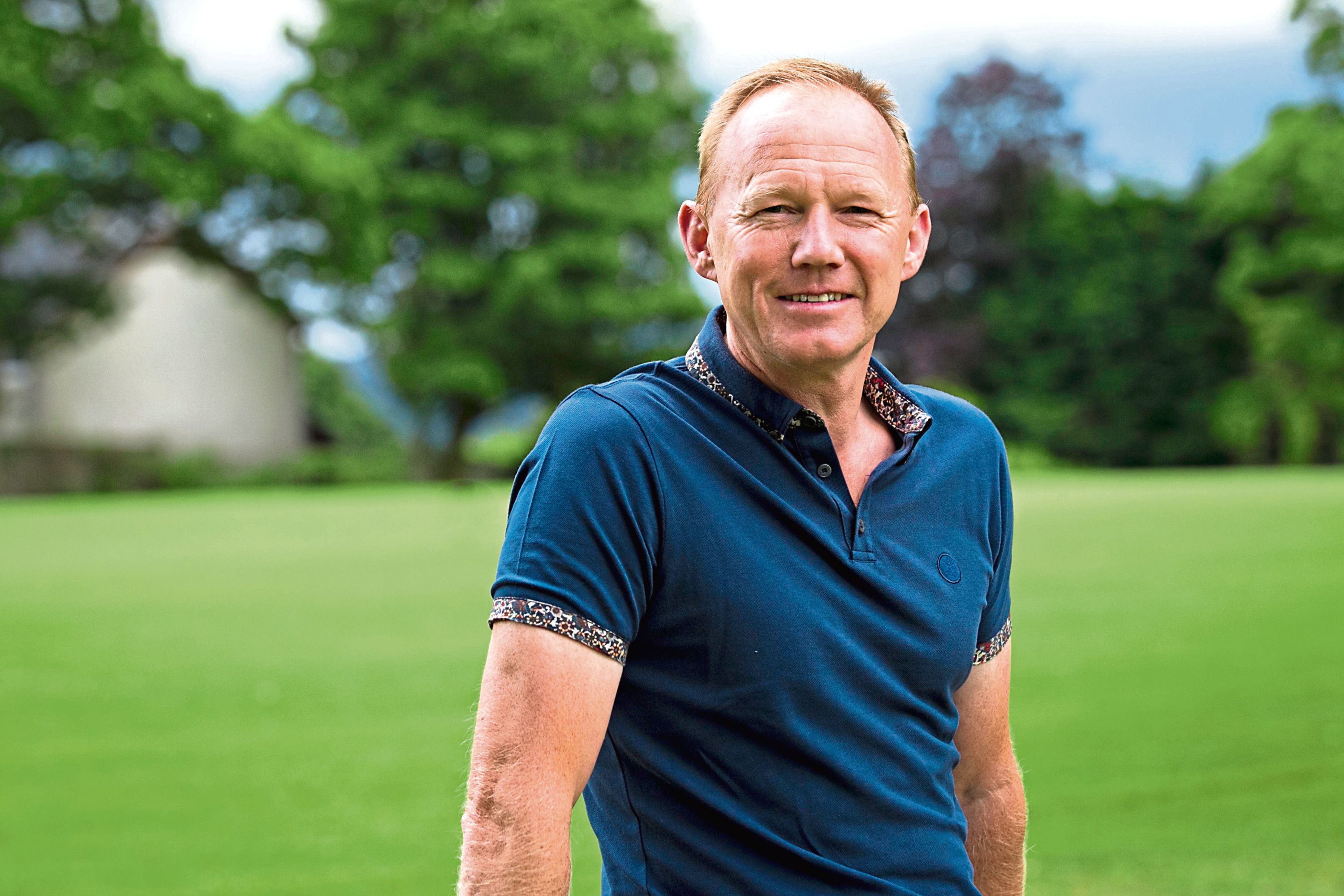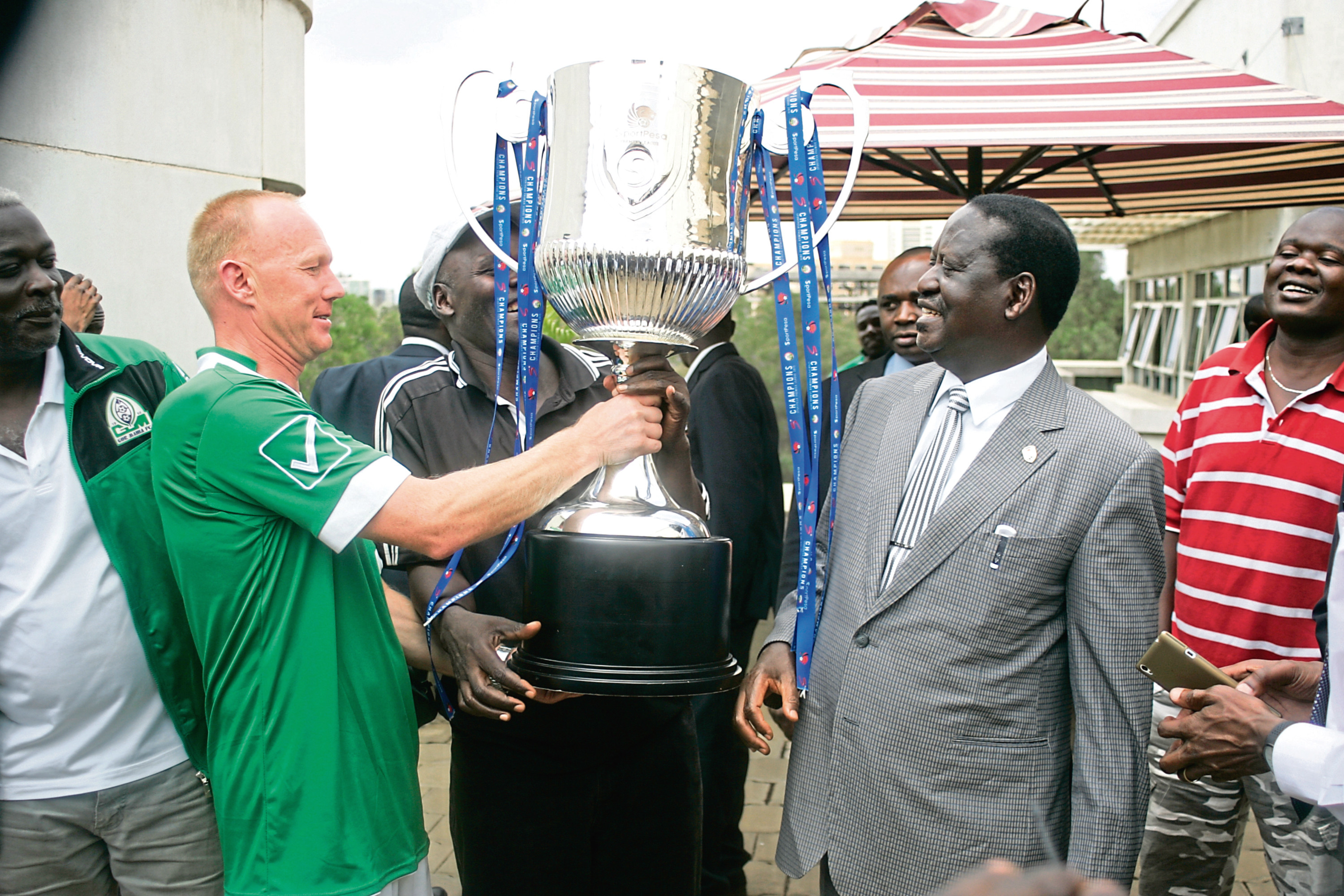
SUCCESFUL Scottish managers are thin on the ground these days.
There are plenty doing good work at clubs with limited resources, but it’s a bit of a rarity to hear of one lifting a trophy.
Not a single Scot takes charge of a team in England’s top flight, and half of the SPFL Premiership clubs will kick off the new season next weekend with a boss who was born outside Scotland.
That might make some coaches think of looking overseas for employment.
Frank Nuttall sees it differently.
He believes he’s ready to come home and show he has what it takes to win things in Scottish football.
Frank who? You might well ask.
Last week, the 50-year-old was able to walk the streets of Glasgow in complete anonymity.
He wouldn’t find it so easy, however, in many of the great cities of Africa.
The last four years have seen him taking charge of major clubs in Kenya and Ghana.
In between those two jobs, he was assistant coach to Scotland boss Alex McLeish at Zamalek in Egypt.
A look at his record of achievements makes impressive reading.
With Gor Mahia in Kenya, he won two league titles, the Super Cup and was Coach of the Year for 2015 after an unbeaten season.
He led Ghana’s Hearts Of Oak to victory in the Independence Cup, and took them to their FA Cup Final for the first time in 17 years.
There’s no doubt it’s a challenging environment to work in, and his tenure at the club ended earlier this year in acrimonious circumstances.
A corruption scandal means the Ghana FA is currently being run by the country’s government and FIFA officials.
But Nuttall has never been one to shirk a challenge.
He’s spent 30 years developing a coaching career after being freed by Celtic at the age of 20.
It’s a journey that has taken him to places like Palestine, Qatar, North Korea and China.
There have been jobs in different capacities at clubs such as Rangers, West Brom, Bristol City and Hibs.
He worked at Middlesbrough under England boss Gareth Southgate, a man who managed to sweep away all the doubters with his performance in the World Cup.
However, Frank’s African adventure was where he really struck out on his own as a manager, and he’s keen to replicate that success closer to home.
He said: “Winning games and competitions is what I love. I’m not a great one for just taking part. It’s just not me.
“That’s why I quote my achievements. They’re why I’m in football.
“Having been around different parts of the world, I know where there are players, and who can bring me players.
“That’s just waiting to happen. You just need someone believing in you.”
Many people will tell you footballers are the same all over the world.
There are egos to be dealt with in every dressing room – some need an arm round the shoulder, while others respond to a stern word now and again.
Managing in Africa, as Frank quickly realised, is even more complex.
He said: “There are a lot of challenging situations around football and life.
“There was no training ground during my first year in Kenya. In my second season, we got a 3G pitch installed in a fairly run-down area.
“Our slot on it was from 8am to 10am, and then other people were using it.
“A lot of the challenges were financial.
“There would often be delays in salaries, and keeping the group motivated during those times was difficult. But we always found a way.
“In Ghana, we would have some pretty crazy scenes after games.
“We would have a lot of people turning up at press conferences, who weren’t journalists. It was their way of trying to make money because we were big news.
“In derby matches, we would play in front of 40,000 fans and there was a great atmosphere.”
Frank’s African adventure was brokered by former Kilmarnock and Hibs manager, Bobby Williamson.
The two men met up in Scotland a few days ago, Williamson delighted to have won a recent battle with cancer.
“I first got to know Bobby when he was the coach of Uganda,” said Frank.
“I was always asking him if he needed an assistant, or if there were any jobs going.
“He moved to Kenya, and started coaching Gor Mahia. He won the league for the first time in 18 years and became the national team coach.
“The club chairman asked Bobby to find a successor, and he came on the phone, asking if I wanted a job.
“I went out there, and that was my first job as a head coach.
“All the things I did in the years before prepared me for that job, and led to the success I had.
“In a way, it was good to wait that long. I knew I could do it because I had worked in coach education, and knew I had skills others didn’t.
“I had a meeting with Dr Jo Venglos when he was Celtic manager.
“He insisted I didn’t stay as a fitness coach. He said: ‘You have this additional information and knowledge that most coaches don’t know.’ ”
Nuttall was taking charge of teams while still a student
He explained: “I started coaching when I was in my first year at college in Cardiff. I really enjoyed developing players and winning matches.
“After that, I went to work in the USA for a coaching company based in Kansas.
“They let me work with an Olympic development squad, where the players were all around 17 years old.
“There were some very decent players, and although I was just a couple of years older than them, I found I could help.
“I came back to the UK, and started playing rugby league, as well as football.
“I ended up playing for the Welsh students, and I remember getting absolutely battered in a game against France.
“It was there I met Clive Griffiths, who has coached in both rugby league and rugby union. He was very influential.
“I learned a lot from him, and found guys like him really interesting. They were really technical and thorough in detail about what they were doing.
“I did teacher training because I knew it would help my coaching.
“My first job was working in sports science at the sports institute in Cardiff, where I was responsible for nine sports, including Commonwealth Games disciplines.
“So I ended up working with cyclists, swimmers and track & field athletes.
“At a very young age, I was working with coaches who’d been to the Olympics, and I was managing athletes.
“Then I went back into football. It was what I always wanted to do.
“I became player-manager of a team, Garw, that was bottom of the Third Division in the Welsh League.
“I got guys in who’d been released by Cardiff City and Swansea. By the end of the season, we missed out on promotion by just one point.
“I just kept going and knew at some point I wanted to get into coaching.
“It was really difficult because there were so few jobs available.
“I ended up coaching coaches as there were openings there and it was needed.
“My route back into football came when I had three interviews for the job of a fitness coach at Tottenham.
“I missed out on it, but David Pleat recommended me for a similar job at West Brom. That was me back into football full-time.
“It wasn’t ideal, but it was a start. Since then it’s been a long and rocky road.”
Nuttall knows getting a break in his home country won’t be easy.
However, there is a growing acceptance that you don’t need to be a top player to become a successful manager.
Men such as Jose Mourhino, Brendan Rodgers and new Chelsea boss Maurizio Sarri are prime examples.
This globetrotting coach is reluctant to compare himself with those famous names, but he is heartened by their success.
“I hope my next job is not too far away, but I know it won’t just be handed to me,” he said.
“After all the years of travelling, being based in the UK or Europe would be my preference.
“I hope there is a decision-maker at one of the clubs who looks at my CV and sees I’m capable of producing the goods.
“I take encouragement from other coaches who are being successful, but didn’t have illustrious playing careers.
“A lot were in similar situations to me and have proved their worth.”

Enjoy the convenience of having The Sunday Post delivered as a digital ePaper straight to your smartphone, tablet or computer.
Subscribe for only £5.49 a month and enjoy all the benefits of the printed paper as a digital replica.
Subscribe